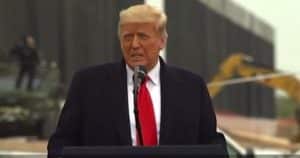House Democrats File Lawsuit Against FEC Over Campaign Finance Allegation
The Democratic Congressional Campaign Committee has launched a legal challenge against the Federal Election Commission over what it describes as improper use of a campaign finance loophole by Republican candidates in television ads.
The lawsuit calls for a court ruling to clarify the legality of these advertising practices prior to the Nov. 5 election, as Fox News reports.
On Thursday, the DCCC initiated the lawsuit, alleging that the FEC failed to address a critical issue related to campaign finance. The case was filed in the U.S. District Court for the District of Columbia, as first reported by Axios. At the heart of the lawsuit is an accusation that Republicans are utilizing joint fundraising committees to mask television attack advertisements as fundraising efforts, thereby avoiding established fundraising limits.
Dispute Over Joint Fundraising Committees
This purported maneuver allows these committees to exceed traditional caps by positioning the ads as fundraising initiatives rather than candidate expenditures. The DCCC seeks a resolution from the federal court to determine whether this practice meets the legal benchmarks. The timing of the decision is especially crucial, given the looming national elections set for November 5.
Earlier attempts to address the issue within the FEC stalled when a vote resulted in a deadlock, with a 3-to-3 split along party lines. This impasse effectively permitted the continued broadcast of these controversial ads.
The DCCC expresses concerns that the ongoing practice forces its candidates into a dilemma. They are faced with the choice of either adhering to what they perceive as illegal conduct to remain competitive or risk losing significant financial ground to their Republican competitors.
Responses from Key Leadership
The National Republican Senatorial Committee countered the DCCC's claims by asserting that television ads of this nature received unanimous approval in 2007 and were recently reaffirmed. In this context, the DCCC’s lawsuit is characterized by some Republican voices as a desperate measure.
Rachel L. Jacobs, the general counsel for the DCCC, emphasized that, according to federal law, all party committee expenditures coordinated with candidates should be subject to strict limits. She argued that limited financial resources have propelled Republican candidates to exploit this loophole, enabling them to spend far beyond the set limits for party committee funds on candidate advertisements at reduced rates.
Jacobs also noted the predicament facing Democratic candidates, who must choose between participating in potentially illicit practices without guarantee of reprisal from enforcement agencies or being outspent by their Republican adversaries by substantial amounts.
The Stakes of Legal Interpretation
Meanwhile, FEC Chairman Sean Cooksey has confidently dismissed the lawsuit as baseless. Cooksey remains confident in the FEC's position, asserting that they anticipate emerging success in court.
NRSC's general counsel, Ryan Dollar, echoed a similar sentiment, labeling the lawsuit as an act of desperation, further asserting the compliance of the television advertisements with historical and recent approvals.
Dollar questioned the motive behind the lawsuit, especially in light of other entities such as Harris Victory allegedly engaging in similar practices.
Financial Implications and Context
The allegations are set against a backdrop of high-dollar fundraising activities. The Congressional Leadership Fund reported a record-setting quarter, with a total of $81.4 million raised between July and September of 2024, showcasing the financial stakes in the upcoming election cycle.
Contrasting these figures, the Senate Leadership Fund reported an even more substantial windfall, bringing in $114.5 million during the same timeframe. These figures highlight the significant financial landscape in which both parties operate and underscore the potential impact of alleged loopholes.
Overall, the outcome of the lawsuit could hold significant implications for campaign finance oversight and the regulatory landscape governing electoral advertising. As both sides prepare for a legal battle, the decisions made by the court may reshape how campaign finance laws apply to future elections.




